Defining how ‘smart’ a country is goes beyond stereotypes or single measures, reflecting how effectively nations learn, create, and apply knowledge. Strong education systems equip young people with essential skills, scientific research drives discovery, and cognitive ability underpins innovation and problem-solving. To capture this more complete picture, TradingPlatforms analysed the latest OECD PISA 2022 results in science, mathematics, and reading across 77 countries, combining them with national scientific publication output and average IQ scores to create a comprehensive global ‘smartness’ ranking.
Key takeaways
- Hong Kong tops the global ranking with a Smartness Score of 94 out of 100 and leads the world in research volume, producing 548.5 scientific papers per million residents.
- People in Taiwan have the highest average IQ in the world, 107.1.
- Europe’s smartest country is Switzerland (72.2/100), while Hong Kong ranks first in Asia (94/100), Canada (55.45/100) tops in North America, and Chile (27.6/100) ranks first in South America.
World’s Smartest Countries
Data source: OECD, Nature.com, International-IQ-Test.com, United Nations
Main Findings
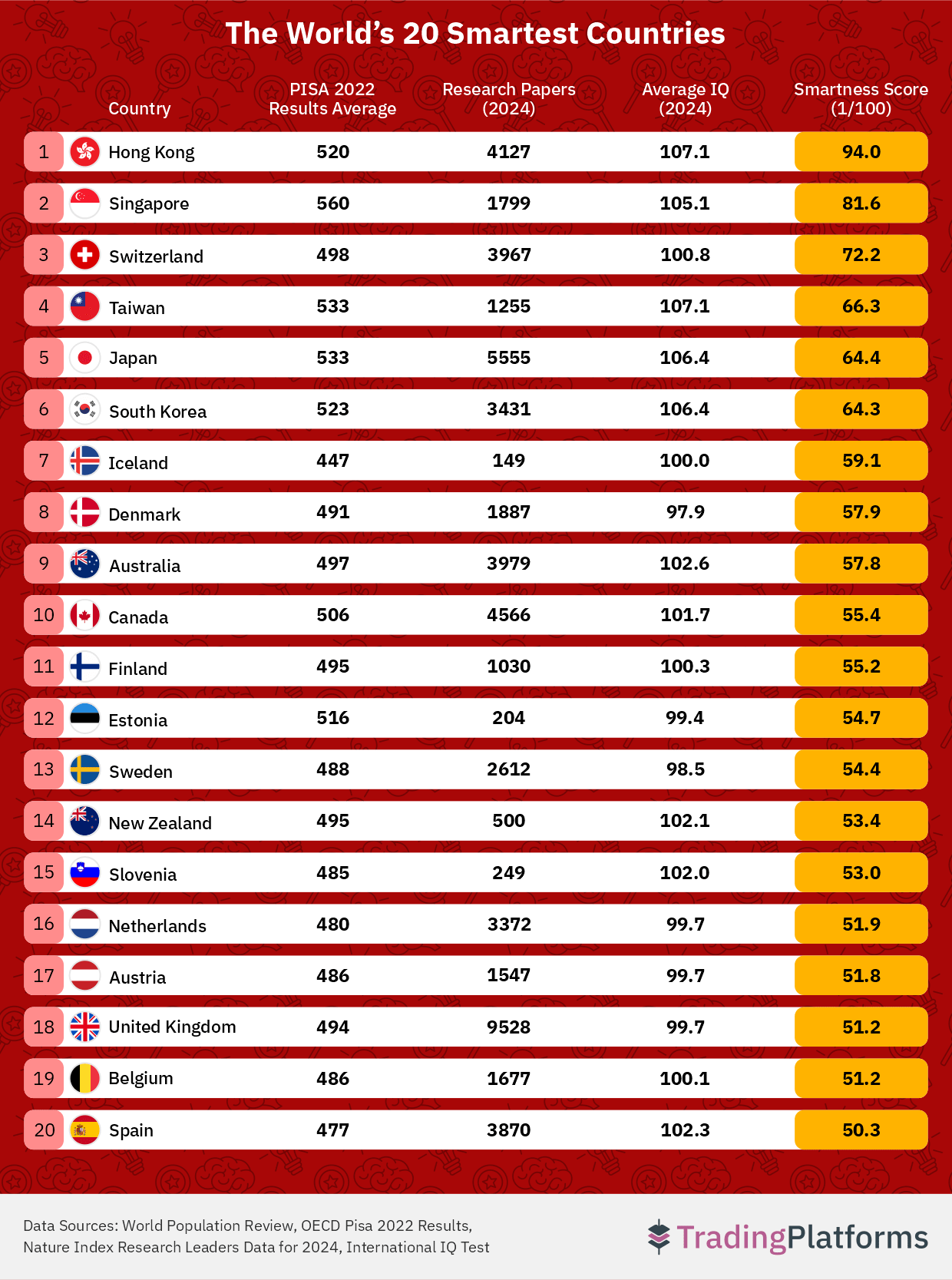
Hong Kong ranks first on the global Smartness Ranking (94/100), driven by a strong PISA average of 520 points for reading, science, and math among 15-year-olds in 2022. The average IQ for Hong Kong in 2024 stood at 107.06, the second-highest in the world among the 77 nations studied after Singapore (IQ of 107.10). Even more interestingly, researchers from local universities have contributed 4,127 scientific publications throughout 2024, which is a substantial research output, coming up to 548.5 scientific papers per million residents.
Singapore posts the highest PISA result, with students scoring an average of 560 points on the three tests. The country also has the fifth-highest average IQ in the world (105.1), earning it an overall smartness Score of 81.6 out of 100. Switzerland (72.2/100) pairs an impressive PISA test average of 498 with heavy research activity (3,967 articles published in 2024) and an average IQ of 100.8, while Taiwan, Japan, and South Korea solidify Asian dominance in the global smartness rankings by scoring an impressive 66.3/100, 64.4/100, and 64.3/100 points on the smartness ladder, respectively.
Smaller countries punch above their weight too: Iceland (59.1/100) achieves this with a modest research publication count of just 149 published articles but solid PISA and IQ results. The other Nordic countries – Denmark (57.9/100), Finland (55.2/100), and Sweden (54.4/100), consistently rank highly thanks to above average PISA results and a constant stream of high-quality research publications.
English-speaking nations post mixed results: Canada (Smartness 55.4/100, PISA 506, research 4,566) and Australia (Smartness 57.8/100, PISA 497, research 3,979) score well overall, whereas the United Kingdom, with a smartness score of 51.2/100, produces one of the highest raw research numbers (9,528 publications in 2024) yet achieves only a midpoint overall ranking, showing strong research capacity but comparatively average outcomes in education and cognitive measures.
The Smartest Nations in Europe
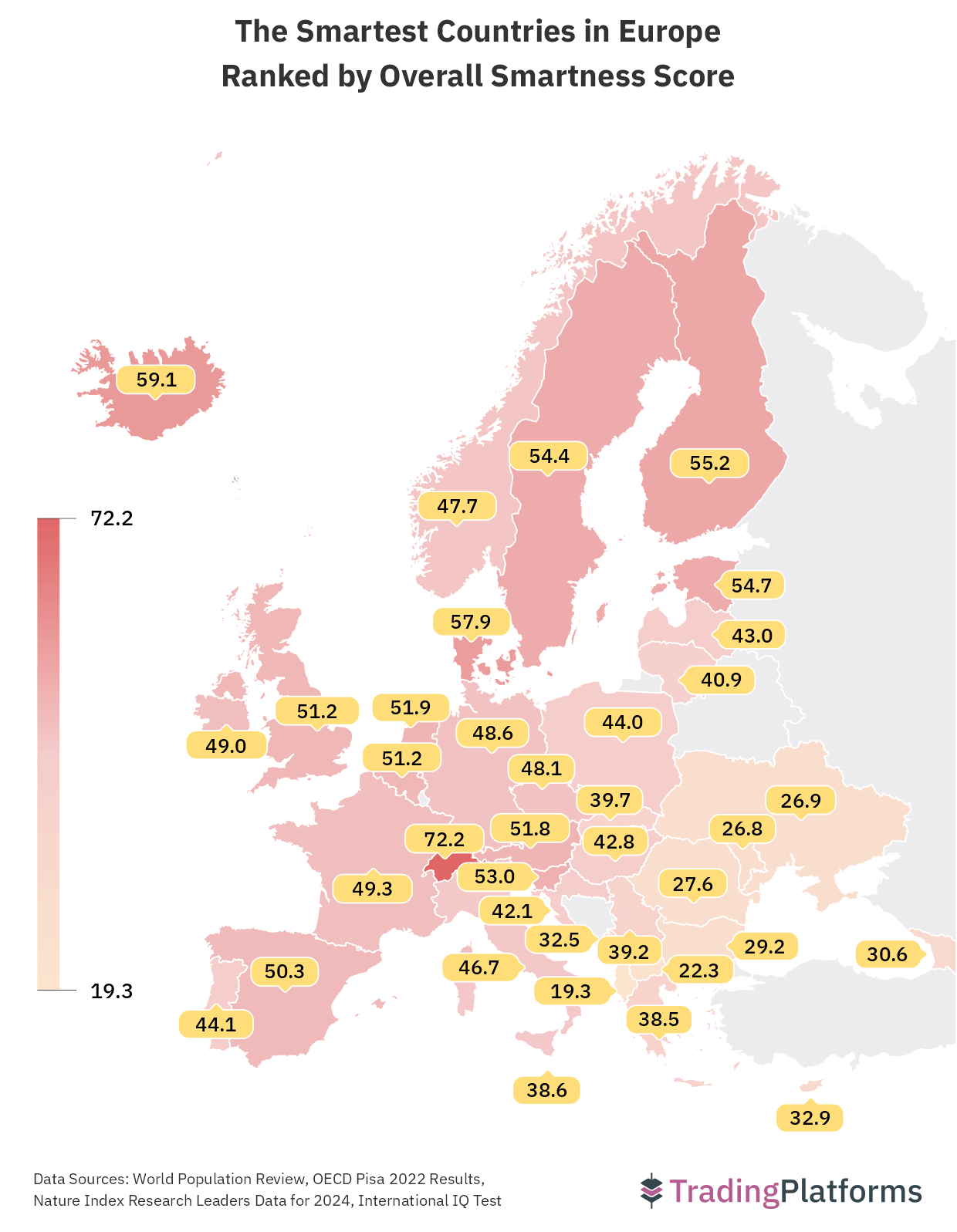
Switzerland leads Europe as the continent’s most intelligent nation, with a smartness score of 72.2 out of 100, followed by Iceland (59.1/100) and Denmark (57.9/100). Finland (55.2/100), Sweden (54.4/100), and Norway (47.7/100), which also feature in the upper rankings, while smaller countries such as Estonia (54.7/100) and Slovenia (53/100) show surprisingly good results thanks to consistently strong student performance, both scoring over 480 in the 2022 PISA assessments. Austria (51.8/100), Ireland (49/100) and the UK (51.2/100) also rank highly, mostly due to a combination of solid education outcomes and substantial research sectors.
Several of Europe’s larger economies score noticeably lower on the index, notably Poland (44/100) and Portugal (44.1/100). Much of Eastern and south-eastern Europe occupies the lower half of the table, with Romania (27.6/100), Ukraine (26.9/100) and Moldova (26.8/100) among the weakest performers. These results highlight persistent gaps in research investment and educational capacity across the continent. A recurring theme among Europe’s top performers is their combination of reliable schooling systems, well-established research ecosystems and supportive policy frameworks; by contrast, uneven funding and limited institutional capacity remain key drivers of the regional divide.
In Focus: Nations Ranked by IQ
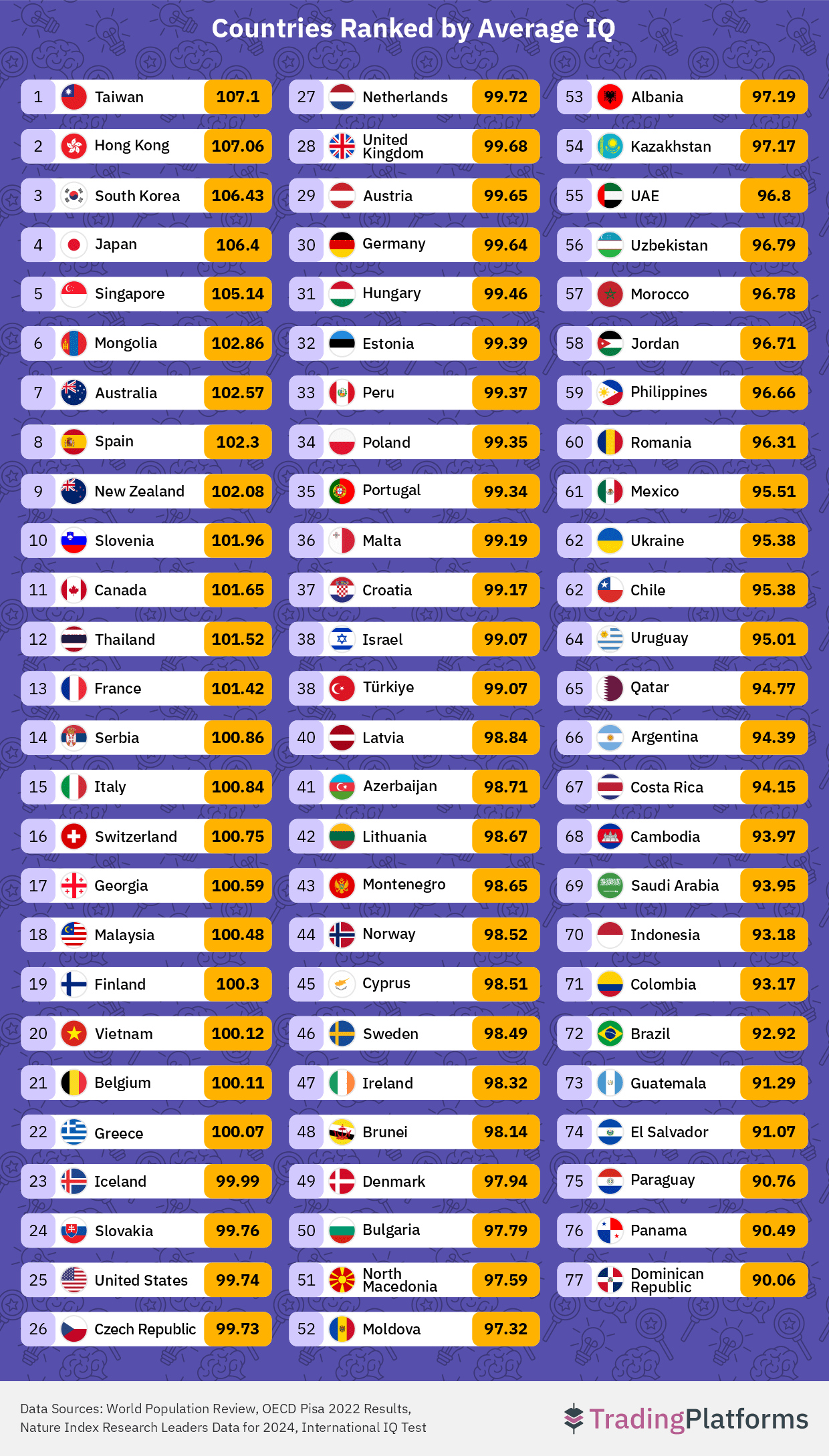
IQ, or intelligence quotient, is a measure of cognitive ability that reflects skills such as reasoning, problem-solving, and learning. The concept originated in the early 1900s when French psychologist Alfred Binet developed the first intelligence test to identify schoolchildren who needed extra academic support. Multiple variations of the original test were introduced and eventually, the concept of a smartness measure led to the term ‘intelligence quotient’ (IQ), coined by German psychologist William Stern in 1912.
Since then, IQ testing has been widely used in psychology, education, and even military recruitment. While the specific tests and methods have evolved, the idea of using standardised tasks to estimate cognitive ability has remained in use for over 110 years. While it does not capture the full complexity of intelligence, IQ remains a useful benchmark for comparing cognitive performance across individuals and nations.
In 2025, East Asia continues to dominate global IQ rankings. Taiwan leads with an impressive average of 107.1, followed closely by Hong Kong, South Korea, and Japan,all scoring above 106. Singapore also ranks among the top performers at 105. These results reflect a strong cultural emphasis on education, rigorous schooling systems, and investment in human capital, which together help explain why many East Asian economies are also among the world’s most competitive and innovative.
Beyond East Asia, there is a cluster of nations with average IQs slightly above 100, spanning diverse regions from Europe to Oceania. Countries like Australia, Spain, Canada, and New Zealand all post scores around 102, while Slovenia, France, Italy, and Switzerland fall just above or below the 101-100 mark. These figures suggest broadly comparable cognitive performance across advanced economies, though differences in educational policy, socioeconomic conditions, and testing methodologies always influence results.
Meanwhile, many countries in Latin America, the Middle East, and parts of Southeast Asia report lower averages, typically in the mid-90s. Mexico, Chile, and Ukraine cluster around 95, while Brazil and Indonesia average closer to 93. At the lower end, nations like Guatemala, El Salvador, and the Dominican Republic score around 90. These gaps often mirror disparities in educational access, economic development, and public health, reminders that intelligence outcomes are shaped as much by environment and opportunity as by individual potential.
Nations Ranked by Scientific Research
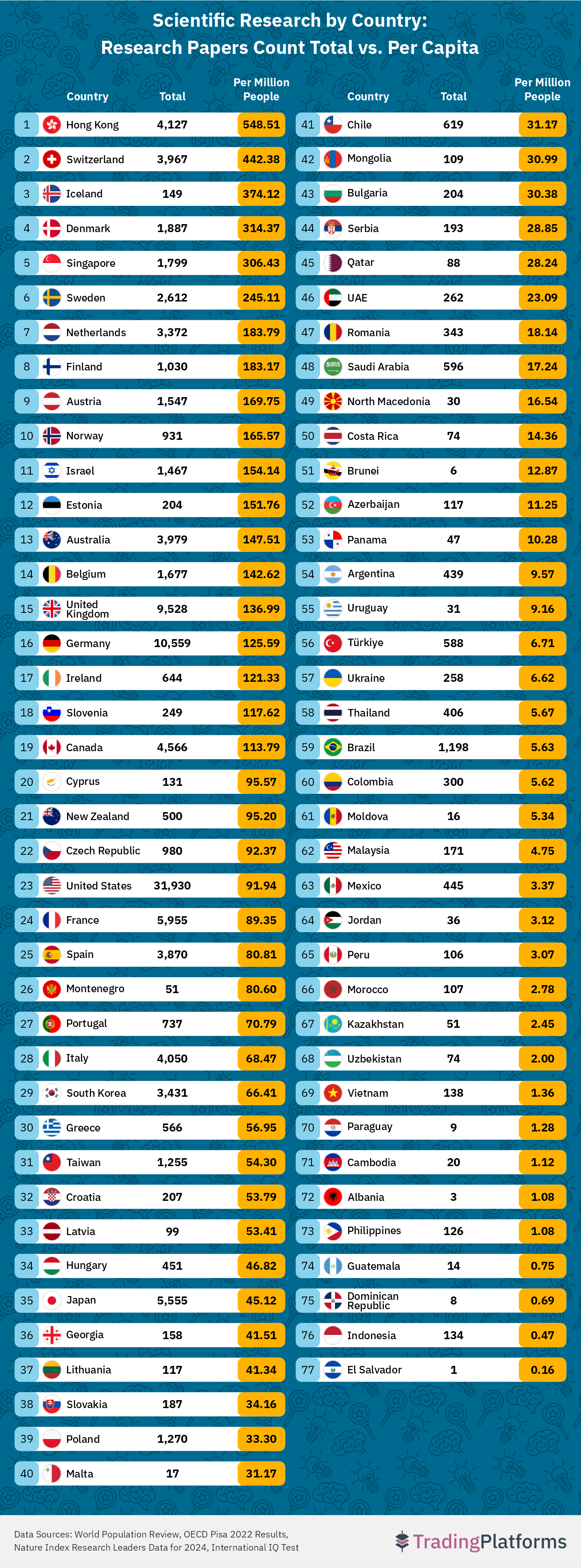
One of the metrics used in our Smartness Index is the nations’ scientific contributions, but looking at the number of scientific papers published within a year does not fully capture a country’s realistic strength in science and research. Similarly to the number of Nobel Prize winners from a certain country, for example, the volume of research papers outweighs nations with larger populations. The United States had 31,930 research papers in 2024, while Hong Kong had just 4,127. Still, Hong Kong’s seemingly modest four thousand publications would be equivalent to the U.S. publishing 190 to 200 thousand if we adjust for population.
When calculated per million citizens, Hong Kong has the largest number of scientific publications in the world, an average of 548.5 papers per million. Switzerland and Iceland also top the rankings in per capita terms, each producing well over 300 research papers per million people, reflecting their strong academic institutions, concentrated funding, and international collaborations. Similarly, countries like Denmark, Singapore, and Sweden also perform impressively, demonstrating how smaller and wealthier nations can leverage targeted investments in education and research infrastructure to achieve high research productivity relative to population size.
PISA Rankings
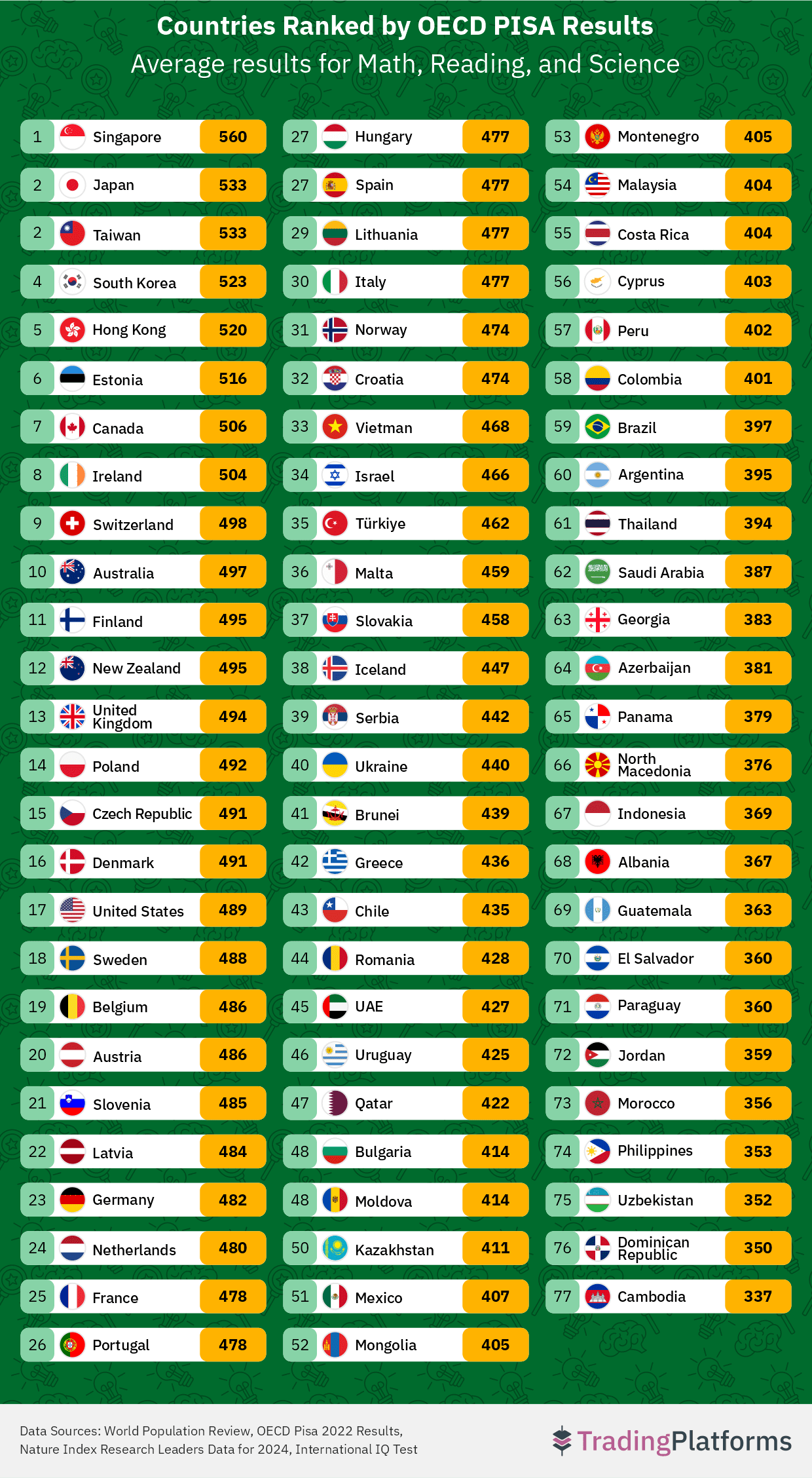
When looking at the latest PISA test results, we can clearly see an educational divide, an increasingly pronounced rift between nations and cultures. East Asian countries are leaders in student achievement: Singapore, Japan, South Korea, Taiwan, and Hong Kong outperform the OECD average by a wide margin. Singapore stands out most dramatically, with an average of 575 in math, 543 in reading, and 561 in science, setting the global benchmark. These results are not a coincidence but the product of long-standing investments in teaching standards, demanding curricula, and cultural emphasis on academic achievement.
In Europe, Estonia continues to be the star performer, with scores above 500 across all domains, proving that a small nation can rival much larger economies when equity and consistency are prioritised. Finland, once the global model, still performs strongly in science and reading, though its results have softened over the past decade. Western European countries like Germany, France, and the UK cluster around the OECD average, while Southern Europe (Italy, Spain, Portugal, Greece) faces more persistent challenges. The Nordics show a mixed picture: Sweden and Denmark perform well, Iceland lags, and Norway remains solid but unspectacular.
North America reflects its longstanding paradox. Canada remains one of the best performers in the Western world, consistently above 500, a testament to its equitable and inclusive education system. The United States, however, still trails behind in math (465), though it scores better in reading and science, a gap that highlights deep structural inequalities within its school system despite its world-class universities.
Looking further afield, the emerging Asian economies provide some of the most interesting stories. Vietnam continues to punch far above its economic weight, with scores close to or exceeding the OECD average. Malaysia and Thailand lag behind, but both have improved over time, showing the impact of rising investment in education. Latin America and the Middle East remain the weakest regions overall: Chile, Brazil, Argentina, and Mexico continue to post below-average results, reflecting persistent inequality and resource limitations. Meanwhile, the Gulf states such as Qatar and the UAE perform better than many of their regional peers but still fall short of the OECD standard.
Methodology
To rank the different nations by their intelligence (in relative terms, of course), the team at TradingPlatforms decided to combine several metrics rather than relying on a single assessment such as IQ. Each country’s ‘Smartness Score’ is constructed from three measurable dimensions: student performance, high-quality scientific output and measured cognitive ability.
For the student performance, we used the latest results from the OECD Programme for International Student Assessment (PISA) for 2022. PISA tests examine what 15-16-year-old students know in mathematics, reading and science, and more importantly, what they can do with that knowledge. What these tests measure more than anything is cognition and problem solving. The tests are computer-based and take up to 2 hours, during which time students answer multiple-choice questions, as well as questions where fuller answers are required. For each of the different domains (mathematics, reading and science), results are scaled based on an average of 500. For our purposes, we took the three scores and calculated their average.
To rank nations’ scientific output, we used the number of research publications for the year 2024 according to the open database Nature Index, which tracks the scientific publications at the national and institutional level. We looked at the volume of research contributions by country between 1 January 2024 and 31 December 2024 and used official population figures (estimates for 2024) to calculate the research papers per million residents in order to accurately compare countries of different sizes).
Various organisations offer IQ tests but not many publish average results per country. We used average national IQ values from the free online International IQ Test website with results for 2024.
To get the final results, we created the Smartness Score, an index-based ranking that combines these three metrics. To simplify the ranking, we converted countries’ results using a standardised 1-100 scale. The normalised score shows countries’ overall performance, ranking them from worst (1 point) to best (100 points).